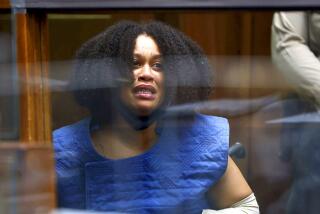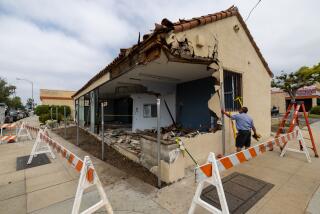In Many Accidents, Your Psyche Suffers the Most
- Share via
Patti Wright was driving to her home in Rancho Santa Margarita from a dental appointment the day before Thanksgiving 1998. As she waited to turn left, another driver barreled through a red light and crashed into the front of her red BMW 325i. The accident strained her hand and hurt her neck. The car was totaled, and it took Wright, a 48-year-old operations manager for a developer, four or five months before she could get in a car and feel comfortable again.
Alta Walters, 41, a Northern California lawyer, was driving on Interstate 580 on Feb. 27, 1997, when another vehicle rear-ended her 1983 Subaru sedan, leaving her with nerve impairment and a lingering fear of rear-end collisions. The worst part, she says, is the utter lack of control she feels to prevent them.
David Lee, 36, of Irvine, was northbound on the 55 Freeway in Orange County in his 1995 Mercury Villager on Valentine’s Day 1997. Traffic slowed, then stopped completely. He was hit from behind by a Nissan pickup. The force of the impact sent his van crashing into another Nissan truck ahead of him.
“My van was all smashed up,” he says. The repair bill was about $7,000. At first, he thought he wasn’t hurt, but three days later his right leg began to hurt. The pain spread, eventually resulting in a diagnosis of fibromyalgia, a poorly understood disorder involving muscular pain and tenderness at several points in the body.
Lee still drives on the freeway regularly, but he says he gets anxious when he hears brakes squealing in traffic.
The experiences of these three drivers are not isolated or unique.
More than 3 million motorists and passengers were involved in auto accidents in 1998 that resulted in bodily injury, the National Highway Traffic Safety Administration reports. Of those injured, anywhere from 10% to 40% may suffer later from post-traumatic stress disorder, according to the findings of two researchers at the University at Albany, State University of New York.
Edward B. Blanchard, a professor of psychiatry and director of the university’s Center for Stress and Anxiety Disorders, and Edward J. Hickling, a senior scientist at the center, are authorities on post-traumatic stress disorder, or PTSD.
PTSD, which commonly afflicts those who served in combat or those who have been assaulted, includes a cluster of symptoms such as reexperiencing the event via mental images, avoiding the site of the trauma and being easily startled or anxious. Some survivors of auto accidents suffer from less serious reactions, such as having an occasional nightmare about the crash, Blanchard and Hickling say.
The problem, as they see it, is that many people involved in crashes spend more time fixing their vehicles than their psyches.
Most adopt Alta Walters’ attitude. Even though she had hand and back problems after the accident, she figured she would be better in a week or two; ultimately, her physical problems lasted much longer than that. In addition, she had nightmares about the accident that persisted for several months, yet she never sought professional help, she says.
Emergency room physicians who treat accident victims should be on the lookout for psychological trauma, Blanchard and Hickling suggest, and refer patients to mental health experts when necessary. Those who survive such accidents should realize that they are not abnormal or weak if they suffer psychological problems and that if the problems don’t abate with time, they should get help.
*
In a five-year study funded by the National Institute of Mental Health, Blanchard and Hickling evaluated 156 survivors of auto accidents in which the injuries were severe enough to warrant emergency-room treatment. They found that 40% had post-traumatic stress disorder, which is diagnosed after symptoms such as flashbacks persist for 30 days or longer.
In cases where survivors file lawsuits arising from their accidents, there may also be an increased risk of psychological problems. In a separate study of 132 subjects, Blanchard and Hickling found that the 67 who filed lawsuits had higher levels of PTSD than those who were not involved in litigation. Over the course of a one-year follow-up, the litigants’ depression and anxiety did not improve, but those who didn’t litigate did improve in those areas, the researchers reported in 1998 in the Journal of Traumatic Stress.
Those who fear dying in an accident, who are waiting for a court decision about the accident or who are seriously injured are at higher risk of getting PTSD, Blanchard and Hickling have determined in their studies, the results of which appear in several medical journals and in a 1997 book for mental health professionals, “After the Crash,” published by the American Psychological Assn.
Now the researchers are conducting a study to determine why some survivors still have PTSD up to two years later, and they hope to write a self-help book for people who survive auto accidents.
Blanchard and Hickling have cataloged some of the typical reactions of auto accident survivors.
Many, for example, will hear the crash sound or retain a mental picture of the crash after the accident. When someone reexperiences the event in this way, Hickling says, “your mind is trying to make sense of what happened,” using the mental snapshot of the accident scene.
After her accident, Alta Walters dreamed not about the crash itself but the mental picture she had of the two other women involved as they stood on the freeway. In her dreams, she yelled at them to move to safety, but they stood paralyzed with fear, and she saw another car hit them and pin them against their vehicle.
“I dreamed that six times, for about six months,” she says.
Avoidance of the accident scene is also common, as some drivers resort to alternate routes or reduce the amount of driving they do. Some survivors suffer anxiety when they are reminded about their accident--and leave the room, for instance, if a newscast shows an accident.
Some people feel numb and withdraw from social activities, the researchers also found.
Survivors of an accident can try self-help at first, Hickling says. Those who are avoiding the accident scene, for instance, should gradually desensitize themselves by driving closer and closer to the site until they can drive the road again without anxiety. Taking someone along is fine, Blanchard adds. So is talking oneself through the experience--doing deep breathing and reassuring yourself that you’ll be OK--as long as the message stays positive.
“Don’t talk to yourself in the wrong way,” Blanchard says, such as saying, “I must have a bulls-eye on the back of my car.”
Talking about one’s anxieties with a trusted friend or family member can help too, Blanchard and Hickling say. They suggest that accident survivors try to resume socializing or return to hobbies and other activities they may have given up.
Generally, they say, survivors should realize that a serious car accident can raise existential issues.
“There is the feeling you could have died,” Hickling says. “For many, this brings up issues of life and death and ‘What does life mean?’ and ‘What am I doing with my life?’ ”
*
Understanding other dynamics can help too. In their studies, Blanchard and Hickling have found that people who are at fault in an accident might have an easier time of it, psychologically speaking. That’s because if survivors can pinpoint the reason for the accident--speeding, daydreaming--they can figure they can learn from the experience and reduce their risk of another accident.
“If you are in an accident and the other person is responsible and you did nothing wrong, you are more likely to get PTSD,” Hickling says. The notion is that the world is out of your control, and that can be depressing.
Those who suffer physical injuries that persist also tend to fare worse psychologically, the researchers say.
“The injury can be a constant reminder of the accident,” Hickling says.
With time, some accident survivors get better on their own.
Wright, the Orange County woman who survived a 1998 crash, recently got behind the wheel to teach her teenage son to drive.
Those who don’t see improvement at the six-month mark, Blanchard says, should consider seeking professional help.
*
Good Carma is a guide to automotive-related health and consumer issues. Kathleen Doheny can be reached at kdoheny@compuserve.com.
(BEGIN TEXT OF INFOBOX / INFOGRAPHIC)
Psyche Repair
Survivors of auto accidents often need help not only for their physical problems but also their psychological ones. Here, a quick guide on common aftereffects and how to handle them.
* Having nightmares about the crash: Realize that this is your mind’s way of making sense of the crash to try to sort it all out. If bad dreams persist, however, professional help is recommended.
* Feeling out of control while driving: Be aware that the feeling is much more common if the accident was not your fault. If you were at fault and the accident can be pinpointed to factors such as speed or daydreaming, you may tend to rationalize that you can control future risk of being in an accident.
* Feeling numb and wanting to withdraw: Talk to a trusted friend or family member about the feelings and make a conscious effort to participate again in activities you like.
* Avoiding the scene of the accident: Desensitize yourself gradually by returning to the scene, but without making yourself anxious.
More to Read
Sign up for Essential California
The most important California stories and recommendations in your inbox every morning.
You may occasionally receive promotional content from the Los Angeles Times.













